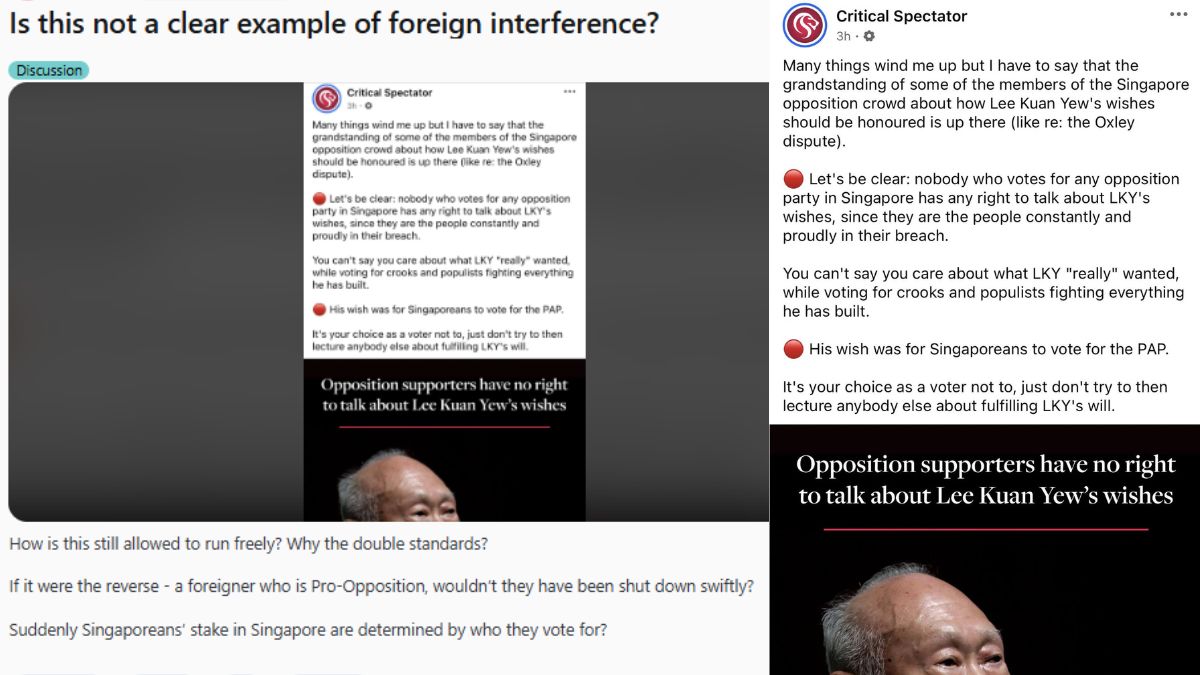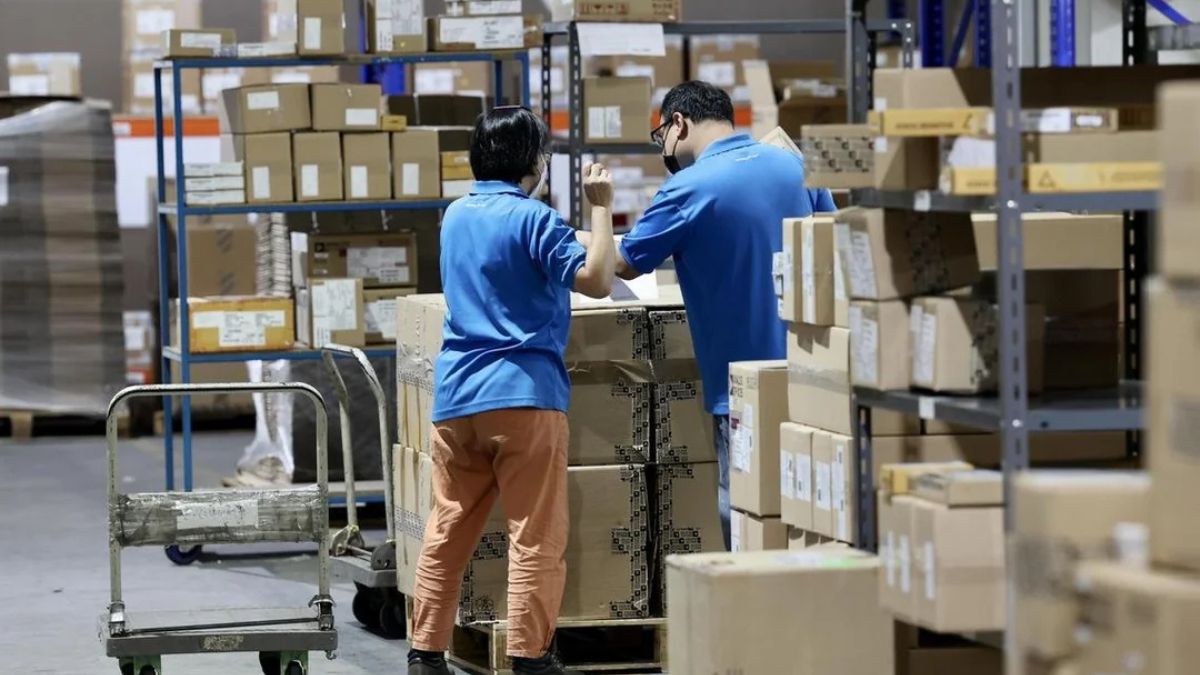Reddit post sparks debate over CECA benefits for Singaporeans
A Reddit post sparked debate over the Comprehensive Economic Cooperation Agreement (CECA) after an Indian national asked how to move to Singapore for work, prompting netizens to question whether the agreement benefits Singaporeans.

- A Reddit post on 24 November sparked debate over the Comprehensive Economic Cooperation Agreement (CECA), with users questioning whether the agreement provides benefits for Singaporeans.
- Some users argued that CECA brings economic advantages through cross-border investment and trade.
- Other users expressed concerns that local professionals are displaced and that social benefits for Singapore remain limited.
SINGAPORE: A Reddit post has sparked discussion over the Comprehensive Economic Cooperation Agreement (CECA) and whether the arrangement provides tangible benefits for Singapore and Singaporeans.
In a post published on 24 November, the original poster (OP) wrote that it “makes me very sad when I see this kind of discussion”, describing CECA as a “truly open leg policy for CECAs”.
CECA is a free trade agreement signed between Singapore and India in 2005, intended to strengthen bilateral trade and economic collaboration.
The OP attached a screenshot from the subreddit r/indiansinsingapore, featuring a discussion about migrating to Singapore.
The screenshot showed a user hoping to “get a job and settle in Singapore”.
The user stated completion of both undergraduate and postgraduate studies (MSc Finance) and current employment with American Express in India.
The user requested guidance on planning a move from India to Singapore within two years, including visa requirements, necessary processes, and experiences from others who had previously relocated for employment.
The user also clarified that no further studies in Singapore were planned, with the intention focused solely on direct employment.
One commenter suggested using an intra-corporate transfer (ICT) from the American Express office in India to the Singapore branch, noting that this pathway would be approved under CECA.
Netizens Debate CECA and ICT Pathways
The post prompted extensive discussion among Singaporean Reddit users on the implications of CECA and the pathways available under the agreement.
Several commenters highlighted that ICT arrangements are not unique to CECA and are commonly available to employees of multinational corporations.
One user noted that backdoor transfers are very common, adding that employees in multinational corporations often request a transfer to the Singapore office by citing business reasons, particularly if the individual holds a key position within the firm.

Another commenter described ICTs as “one of the perks of working in a multinational company”, adding that companies seldom approve transfers without valid business reasons, specific openings, or performance-based justifications.

Other commenters expressed frustration over perceived misuse of ICT arrangements. One user wrote that ICTs are understandable when companies need to establish operations in Singapore, “but what I cannot accept is for those who come here on ICT to look for another job while in SG.”

Questions Over Benefits of CECA to Singapore
Some users questioned whether CECA had delivered meaningful benefits to Singapore and Singaporeans.
“Honestly, can someone explain to me how does CECA benefit ordinary sinkies? I know for state companies, investment opportunities in India exist, like Air India… not sure how that benefits ordinary sinkies,” one user asked.

One user recalled that government explanations in 2005 emphasised that Singaporeans could also work in India under the agreement.

One user highlighted that CECA had helped create jobs for locals, stating: “Without this agreement Singapore will lose all tech jobs.”
However, another user strongly disagreed, arguing that many local IT professionals have been replaced by new hires from India, resulting in entire IT departments consisting of a single nationality.
This, according to the user, leads to a loss of tech jobs, local expertise, and national dignity in Singapore.
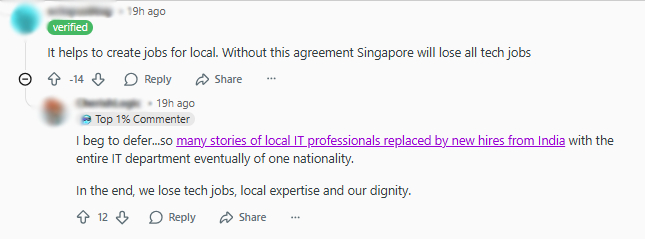
Economic Impact and Investments
Questions were also raised about whether CECA brought exclusive expertise or meaningful economic advantages.
One user asked whether CECA had attracted Indian FDI, encouraged Indian companies to locate regional headquarters in Singapore, or facilitated special investment privileges for Singapore.
Several users argued that CECA had brought economic benefits through cross-border investment and expanded commercial access.
One comment stated that CECA had opened India’s market to Singaporean companies, leading to major expansions by firms such as DBS.
The user argued that CECA produced net economic benefits for Singapore, although social implications remained contentious.
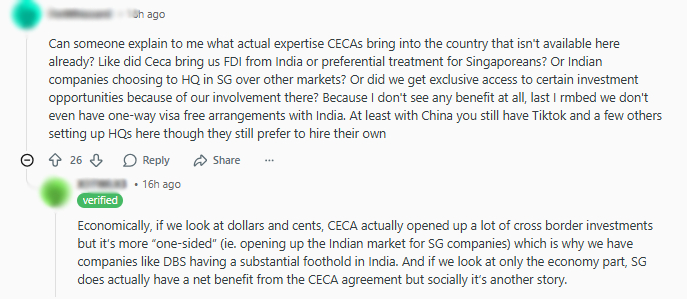
Another comment stated that cross-border investments from CECA largely benefit India, as these investments create jobs and bolster GDP.
However, the comment added that Singapore still gains from CECA because India imports more goods and services from Singapore, supporting job creation locally.
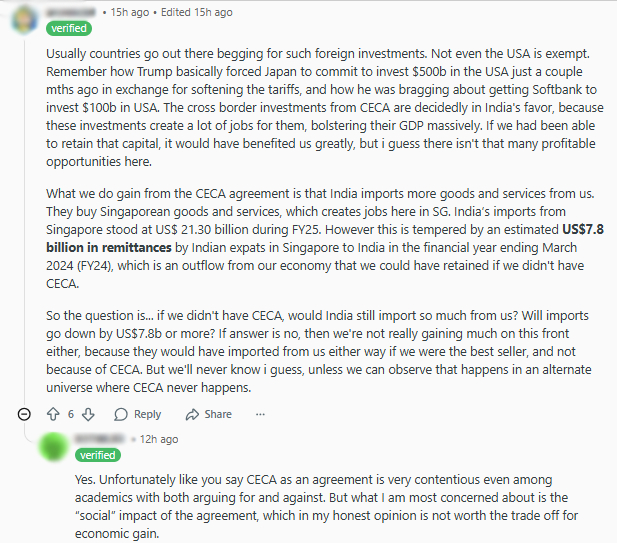
Government Defends CECA and FTAs in Parliament
In February 2025, debates over the India–Singapore Comprehensive Economic Cooperation Agreement (CECA) resurfaced in Parliament, where Minister for Law and Home Affairs K. Shanmugam launched a pointed attack on then-NCMP Leong Mun Wai during the 5 February sitting, accusing him of making racist remarks and promoting anti-Indian sentiment.
Leong rejected this characterisation, stressing that his criticisms of CECA were based on concerns about job security and the economic welfare of Singaporeans, rather than any form of racial animosity.
The exchange took place after Leong questioned the Government’s review of the Chinese-Malay-Indian-Others (CMIO) framework, which underpins race-based policies in Singapore.
Shanmugam subsequently revisited Leong’s earlier remarks on CECA, a bilateral trade agreement between Singapore and India, alleging that some of his statements had fuelled anti-Indian sentiment.
He also cited a 2021 parliamentary exchange in which Leong acknowledged that certain comments could be interpreted as having racial undertones.
During 2021 sitting, Health Minister Ong Ye Kung and Manpower Minister Tan See Leng had delivered ministerial statements on Singapore’s free trade agreements (FTAs), including CECA.
Ong referred to a social media post by Leong, in which he claimed that foreign PMETs (professionals, managers, executives and technicians) and FTAs were affecting the jobs and livelihoods of Singaporeans.
Ong said such statements were false and had been repeated “for too long”, arguing that FTAs and CECA had become “political scapegoats” used to discredit Government policies.
Ong added that the Progress Singapore Party (PSP) had for months alleged that FTAs and CECA led to an unfettered inflow of Indian professionals, displacing Singaporeans and causing various social issues.
He stressed that Singapore’s ability to regulate immigration and foreign manpower was not affected by CECA, and that the Government retained full control over who could enter, work, or obtain residency.
Although the proportion of Employment Pass (EP) holders from India rose from 14 per cent in 2005 to 25 per cent in 2020, Tan See Leng clarified that there was no favourable treatment for Indian EP holders under CECA.
All work pass applicants, he said, must meet the same criteria regardless of nationality.
“Rather, these numbers reflect trends in the global demand and supply of tech talent,” he said.
Defending FTAs, Ong emphasised that they are fundamental to Singapore’s economic viability. FTAs are not only a major factor in drawing investors, but are crucial because Singapore needs access to global markets to “earn a living”.
They are particularly important for small and medium-sized enterprises, enabling them to overcome the limitations of the domestic market and reach overseas customers.
Indian Community and Demographics in Singapore
According to data from India’s Ministry of External Affairs, Singapore hosts an estimated 650,000 overseas Indians, including 350,000 Non-Resident Indians (NRIs) and 300,000 Persons of Indian Origin (PIOs).
As of 2024, Indians formed 7.6 per cent of Singapore’s citizen population. Malays accounted for 15.1 per cent, while Chinese formed 75.6 per cent.



